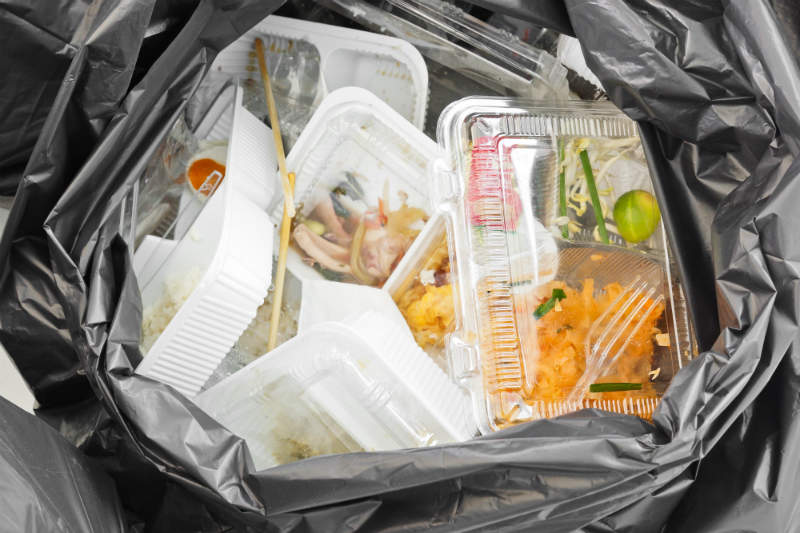

In 2015, an estimated 7.3m tonnes of household food waste was discarded in Britain – a rise from the 7m tonnes seen in 2012. In a bid to put a stop to this issue, numerous solutions have been launched that look to packaging, including size reduction packs, bioplastics and recyclable materials.
Combating consumer food waste through packaging has been looked at as one of the more effective solutions to overcome this vast challenge. WRAP estimates suggest that more than half of the UK’s total food waste derives from consumers and costs each household circa £470 annually. We find out more about the new solutions on the market.
Lidding films: new initiatives for a growing problem
Earlier this year, international developer and supplier of packaging solutions, KM Packaging Services Ltd, launched a new lidding film created especially for demanding applications, offering enhanced seal integrity and puncture resistance. The ‘KPeel Flex Pet’ film aims to help drive down food waste in the manufacturing and supply chain as it offers high impact resistance even under frozen conditions, and is particularly suited to applications where food is pre-baked or cooked in a tray before film sealing takes place.
Graham Holding, commercial director at KM Packaging said: “According to WRAP, the total volume of food waste increased by 4.4% between 2012 and 2015 despite targets intended to turn the tide. Whilst the food industry itself is responsible for only a proportion of this waste, it’s believed that poor or damaged packaging is a notable contributor.
“KM Packaging is working tirelessly to not only anticipate trends in demand and introduce exciting new products, but also to ensure that those new products help to tackle some of the issues faced by the food processing and packaging sectors. KPeel Flex Pet is a real breakthrough in technology that we are confident provides a robust, reliable solution to protect all manner of foodstuffs, and it is rapidly becoming a go-to film for demanding sealing requirements.”
Flexible polymers: oil-based, biodegradable and recyclable alternatives
Aside from lidding films, another solution the industry is working with is more sustainable polymers. Aquapak Polymers Ltd has recently introduced HydroPol – a library of flexible polymers based on polyvinyl alcohol, which is oil-based yet biodegradable and fully recyclable. Dissolving in water, Hydropol bypasses the traditional barriers of flexible plastics recycling, and has been shown to be non-toxic to marine life, making it a much more sustainable alternative to the current polymers in use.
Dr John Williams, business development director at Aquapak Polymers Ltd said: “Flexible plastic packaging is here to stay. Bags, pouches, lids and sachets provide a lightweight and resource-efficient solution for packaging food safely. Now, however, is the time for a new plastics economy. For too long, we have been wedded to particular polymers which – while being fit for their original purpose – are neither biodegradable nor compostable. Flexible plastics pose particular challenges both in waste processing equipment (becoming entangled with machinery, often being contaminated with food, and contaminating other materials) and in the natural environment.
In our view, bioplastics raise difficult questions about sustainable land use. Is it right to be using vast swathes of land to feed our plastic habit?”
He continues: “Unusually for a plastic, HydroPol is hydrophilic, so food is also less likely to perish from sweating. It enables manufacturers and retailers to give positive stories to their customers, and offers the consumer a sustainable alternative that still protects their purchase. Many plastics are used only once, and for a short time, before they become waste. Aquapak’s Hydropol significantly reduces the environmental impact of flexible plastic packaging, without requiring a change in consumer behaviour.”
New initiatives: start-ups create solutions
With overpopulation, climate change and resource scarcity consistently under the spotlight, food and beverage packaging is now more than ever, unveiling and developing new initiatives. In 2015, start-up Revive Eco started to transform coffee ground waste into fertilisers and biomass pellets that could be used as a low carbon heating source. The Revive Eco team collects used coffee grounds from coffee shops across Scotland, which is then taken to their bio-refinery. Here, the natural bio-oils from the grounds are extracted, leaving a carbon-rich by-product. Fergus Moore, co-founder at Revive Eco said: “According to figures from the International Coffee Organisation, approximately 500,000 tonnes of coffee ground waste ends up in landfill every year in the UK. My two co-founders, Scott and Rebecca, and I worked in cafes, restaurants and bars at university, and saw first-hand how much coffee goes to waste on a daily basis. Creating Revive Eco was our way of addressing the issue.”
Another start-up that has food waste firmly at its centre is FRUU – a natural cosmetics business that is also tackling food waste. Founder, Terence Chung has created a new range of skincare products derived from fruit bi-products – a large contributor to landfills worldwide. While the introduction of fruit ingredients into skincare products isn’t new, Chung explains that the use of fruit bi-product is novel for the cosmetics industry. “During my research I found that although there are cosmetic brands sourcing natural ingredients, they aren’t always sustainable. The ingredients typically used are the primary product of crops, whereas we are only sourcing by-products, or secondary products, to help reduce the impact on landfills” he explains.
“We also found that these companies are often only using a small percentage of sustainable ingredients. At FRUU we are trying to use as much recycled material as possible in each of our products. Whereas most ‘ethical’ brands end up being premium products, FRUU’s vision is to create products that are both sustainable and affordable for customers everywhere to increase the chances of changing consumer behaviour and ultimately help address a significant environmental issue.”



